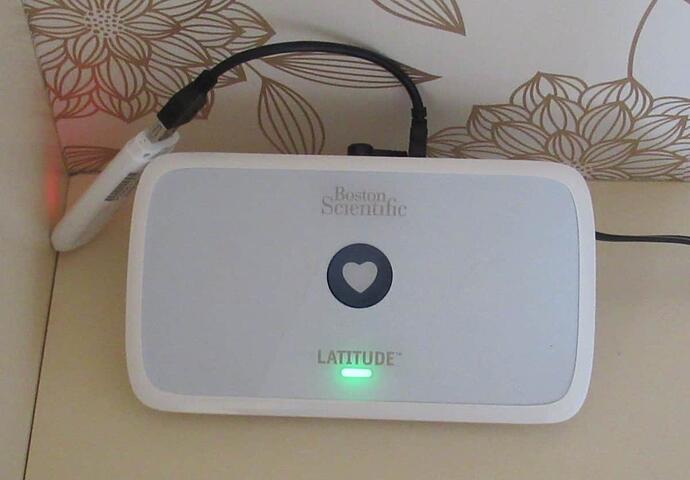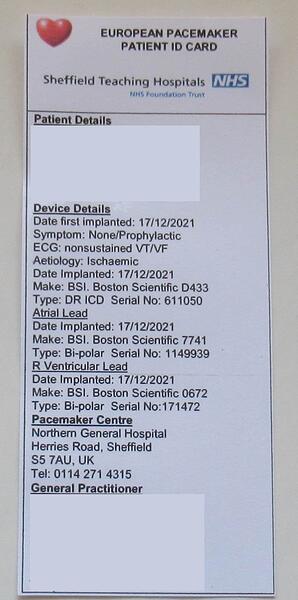I’m sure I won’t.
No pills here JB, and they’ve tried!
However, since I had the ICD fitted and all the associated bruising and stiffness has gone, I don’t even know it’s there…
![]()
Same with other parts of the body, OGF?
No i haven’t got one but I hope you get on well with it. I know other people who have and they got on well with them. @OldGreyFox
Thanks Logan, I can’t honestly say I have noticed any difference so far. My heart rate still drops to below 40 bpm occasionally when I experience a ‘fluttering’ sensation in my chest, despite the cardiologist saying that my ICD is set for my heart not to go below 50 bpm and that my heart monitor isn’t accurate. At the other end of the scale, my heart still reaches 170 bpm when I try to jog, or sometimes even when walking. They want to put me on beta blockers, but having tried them two or three times before, it’s a big NO from me…All they do is dumb me down and turn me into a zombie. I even phoned them last week to report that my ICD wasn’t working and I had to do an instant download of the latest data for the last 24 hours (the ICD usually downloads onto a special router at my bedside while I’m sleeping) and although they did say that my heart rate had gone a little high it was nothing to worry about and I should leave my monitor at home and just jog and walk how I feel (listen to my body instead) so we’ll see how that goes…Thank again for your good wishes though Logan…

Your welcome but sorry @OldGreyFox I didn’t read all of the posts because it always starts at the beginning.
Perhaps that’s the best thing to do with the monitor, perhaps have someone to walk with just in case or not go very far at first.
No I wouldn’t take anything else unless really necessary.
That’s good news!
As for my pills, none of them are for my heart other than the statins and aspirins. Most are for my diabetes.
170 bpm sounds high to me, especially when you’re only walking.
I suppose we have to listen to the experts, but I think you’re still right to question them.
No pacemaker or defibrillator, but have today had a loop recorder implanted.
A 15 minute operation, but three hours in hospital mainly waiting my turn!
Not complaining, mind you, as the staff were exellent in every way. Even when I cheekily asked if they had any spare lanyards (like the ones they were wearing) they were very happy and quick to go and get me one.
Apart from a very little prick (stop tittering at the back) there was absolutely no pain.
It could be there for up to three years now!
Where did they put it? And how do they download the data JB? Sounds very interesting…

Just under the skin in the chest wall over the heart, slightly left of the centreline.
The implant itself is tiny. They give you a small device (to attach on a lanyard, which you’re expected to supply yourself!) to hold over the implant and press the button in case of any event - fit or faint, even just after the event. That marks the time of the event in the implant.
There is also a larger box which you plug into the mains near your bed, which downloads any event from the implant overnight. You can also hold a larger item on the box over the site and download any event straight away if you wish. That box transmits any recordings to the hospital over any mobile phone signal it can find.
Very clever, and I’m not surprised that if I had asked for it to be done privately it would have cost me several £thousands.
My implanted device is made by Boston Scientific.
It causes me discomfort if I try to lie on my left side because I can feel a pulse when it presses on something.
I can trace its outline with my fingers, and one corner of it feels quite prominent compared with the rest.
I’ve been warned not to extend my arms too far above my head or overreach lest I pull the wires out, so you might see me wandering around the kitchen with a small fold-flat step when I need to get things off the top shelf of a cupboard.
I stopped swimming as a result of this advice as well.
Battery life should be about nine - ten years in total, but forcing a download using my bedside base station will reduce this, so I’ve been advised not to do it unless instructed to do so by the local heart institution in Bristol.
My cousin/SiL had a recording device implanted. It stopped working after a few years when the battery went flat. It was another couple of years before it was eventually removed.
I don’t know if my device can be induction charged. I’ll have to ask next time I go for a download. I think a solar panel on my bald bonce would be a better method of powering it than a kinetic device.
The whole device will be replaced as it is a sealed device with no ability to replace just the battery.
It’s a three-wire cardiac resynchronisation device (pacemaker) with built in defibrillator. The defib wire is thicker than the other two to take the charge if it ever needs to fire. The wires have multiple electrodes so if one is touching a dead part of the heart muscle, there will be one or more electrodes touching living muscle.
As for pills, I take ten a day for several different ailments, many of them are to reduce the load on my heart.
Of course. Mine has no wires extending into the heart, which is why it doesn’t cause me any trouble with movement, as does yours.
I may or may not have to have a pacemaker/defibrillator, until more investigations are done. From your description, I’d prefer to be treated with medication if at all possible. Still, whatever happens, I think some inconvenience is preferable to dying!
It doesn’t look the same and is by a different American company, Medtronic.
However, it probably does very much the same.
Yes, now you mention it, the wallpaper is rather hideous! 
Good to hear from you Fruitcake. I also sometimes experience a little bit of discomfort if I lay on my left side, but not all the time. I can feel the equipment quite prominent if I lift my left arm above my head and feel next to my arm pit, but it just feels like a lump under the skin if I stand normal.
Mine is an ICD (Implanted Cardiopacer and Defibrillator) with just two leads. I have to carry this card around with me wherever I go.
To be quite honest, I haven’t noticed any benefit from it yet. My heart still seems to drop below 40 bpm on occasion, and sometimes while out walking it reaches the dizzy heights of 170 bpm which makes me feel quite ill and light headed. Fortunately it only lasts for a minute or two, but it seems to get worse if I stop what I’m doing. I’ve found that I can still jog for a short while but keeping my heart rate below 120 bpm. If I allow it to go any higher it brings on an attack.
I’m usually asleep when I’m in that room JB, so it’s not so bad.
![]()
You mentioned taking medication JB, they want to put me on beta blockers but I have refused to take them. Firstly because they lower my heart rate and blood pressure, which already drops very low in each case, and they dumb me down like a zombie. And secondly, medication has a global impact on your body, unlike a pacemaker/defibrillator which only deals with the problem area. When my Dad passed away he was on 16 tablets per day, he took tablets to offset the side effects that other tablets caused, and I believe they took away his quality of life and perhaps even contributed to his death. I will not go down the same path.
Having just received a telephone call from the Cardiac people at Wythenshawe Hospital (which fortunately is not far from us) regarding the readings over the weekend that I transmitted to them this morning, the consultant is going to arrange for me to come in within the next two weeks to discuss the missed heartbeats I have been experiencing (and which I was already aware of beforehand when I feel my own pulse), and will consider whether or not to implant a pacemaker.
Apologies for the long sentence.
At least they have identified the problem JB, all the best…Foxy takes a breath…

I (thought I had) missing heartbeats which is why I went to see my GP. Even my Lovely Cousin could detect them, but the GP said, “Oh, we don’t worry about that sort of thing. It’s actually an ectopic heartbeat where something triggers a different part of the heart to make an extra beat. This means more blood is pumped, meaning there is then a lag as it takes longer to refill the chamber before it pumps again. This timelag feels like a missed heartbeat.”
The following year, a different GP detected an anomolly that she said was actually present the year before, but the other GP missed. Great.
Anyway, a raft of tests later I was diagnosed with severe heart failure, hence the bucketful of meds per day plus the implanted device.


